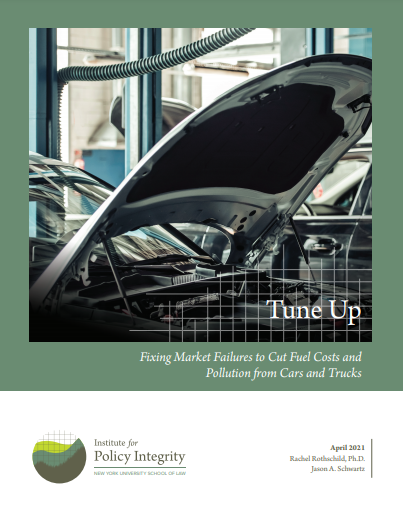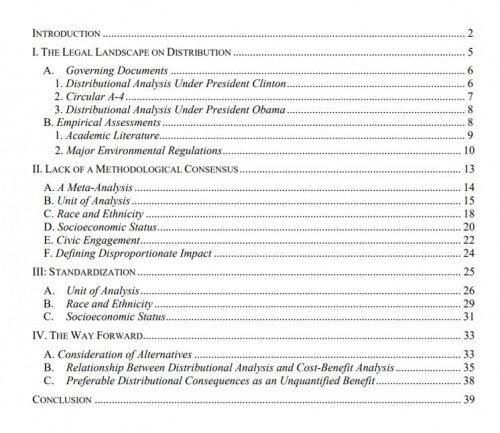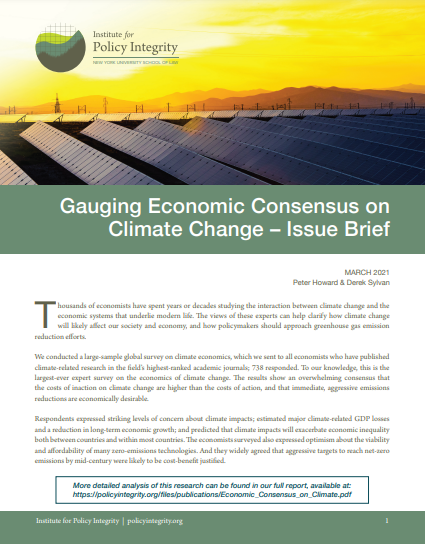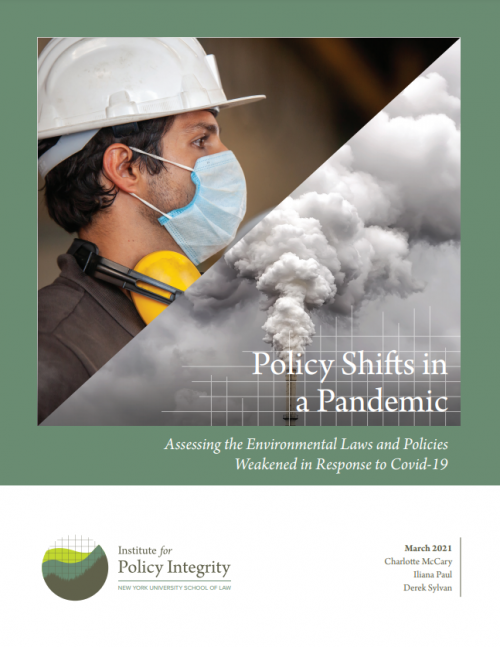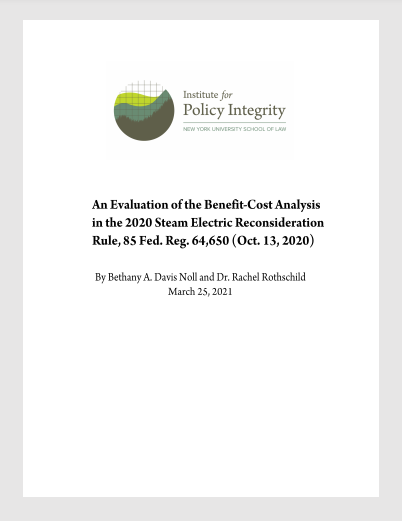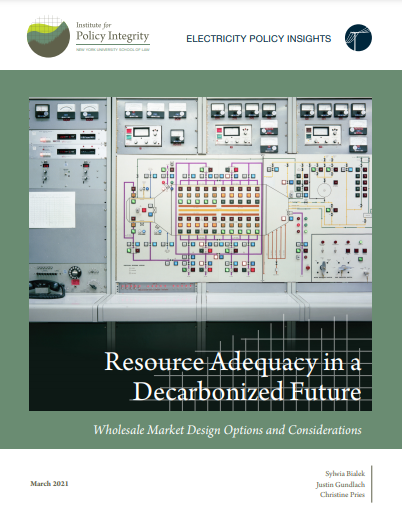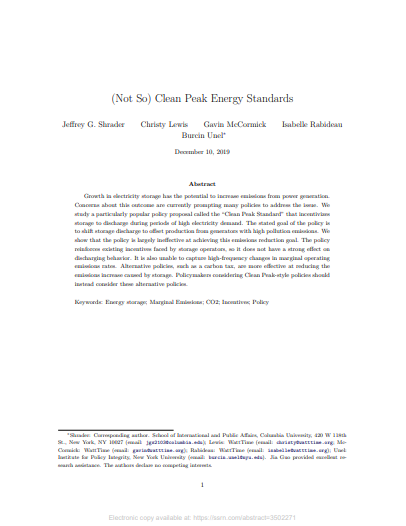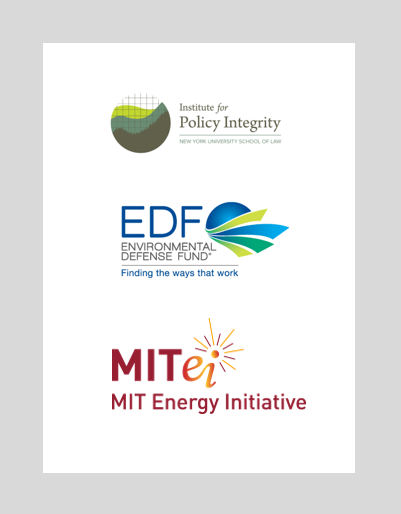-
Tune Up
Fixing Market Failures to Cut Fuel Costs and Pollution from Cars and Trucks
This report analyzes a key issue in U.S. transportation policy: the energy efficiency gap. We discuss the market failures that cause it, and recommend that the Biden administration continue the longstanding practice of incorporating private fuel savings in any evaluation of the costs and benefits of stronger standards for cars and trucks.
-
Distributional Consequences and Regulatory Analysis
Published in Environmental Law
This article examines what it would take for the Biden effort at incorporating environmental justice into regulatory decisionmaking to succeed where the Clinton and Obama efforts failed. It argues that agencies will need to be provided with clear guidance on the methodologies used to conduct distributional analysis, and that the lack of a standardized approach is part of the reason prior efforts failed. It further argues that agencies will need to take seriously the already existing requirement of analyzing the distributional consequences of different regulatory alternatives. Otherwise, they will never be in a position to answer the key question in this area: when are the better distributional consequences of one alternative sufficient to overcome another alternative’s higher net benefits?
-
Gauging Economic Consensus on Climate Change – Issue Brief
We conducted a large-sample global survey on climate economics, which we sent to all economists who have published climate-related research in the field’s highest-ranked academic journals; 738 responded. To our knowledge, this is the largest-ever expert survey on the economics of climate change. The results show an overwhelming consensus that the costs of inaction on climate change are higher than the costs of action, and that immediate, aggressive emissions reductions are economically desirable.
This Issue Brief highlights key takeaways from the survey. A more detailed report is available here.
-
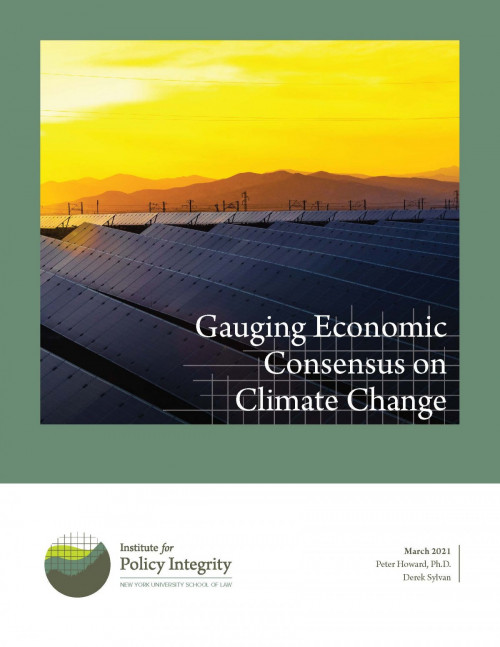
Gauging Economic Consensus on Climate Change
We conducted a large-sample global survey on climate economics, which we sent to all economists who have published climate-related research in the field’s highest-ranked academic journals; 738 responded. To our knowledge, this is the largest-ever expert survey on the economics of climate change. The results show an overwhelming consensus that the costs of inaction on climate change are higher than the costs of action, and that immediate, aggressive emissions reductions are economically desirable.
-
Policy Shifts in a Pandemic
Assessing the Environmental Laws and Policies Weakened in Response to Covid-19
The Covid-19 pandemic has led federal, state, and municipal policymakers to adopt a number of measures that suspended, delayed, or relaxed a variety of environmental safeguards. Our report analyzes these pandemic-related policy shifts and their impacts on public health and the environment. We also provide guidance on how agencies can increase transparency about these actions, counteract detrimental effects, and preemptively create guidelines to improve responses in a future emergency.
-
An Evaluation of the Benefit-Cost Analysis in the 2020 Steam Electric Reconsideration Rule
85 Fed. Reg. 64,650 (Oct. 13, 2020)
In its analysis of the 2020 Steam Electric Reconsideration Rule, the Environmental Protection Agency failed to adequately provide quantitative estimates for numerous harms from steam electric power plants' wastewater streams and drew conclusions about the rule’s impacts that are undermined by a fair assessment of unquantified impacts. Our report identifies flaws in the 2020 Rule and details changes the agency can make to significantly improve its benefit-cost analysis.
-
Resource Adequacy in a Decarbonized Future
Wholesale Market Design Options and Considerations
This report examines the relationship between resource adequacy and renewable energy. It explores the impacts of renewables on the functioning of resource adequacy mechanisms and how different resource adequacy approaches affect renewable investment, finding that current approaches—with certain adjustments—are capable of ensuring that the lights stay on during a future that is powered largely by renewable energy.
-
(Not So) Clean Peak Energy Standards
Growth in electricity storage has the potential to increase emissions from power generation. Concerns about this outcome are currently prompting many policies to address the issue. We study a particularly popular policy proposal called the “Clean Peak Standard” that incentivizes storage to discharge during periods of high electricity demand. The stated goal of the policy is to shift storage discharge to offset production from generators with high pollution emissions. We show that the policy is largely ineffective at achieving this emissions reduction goal. The policy reinforces existing incentives faced by storage operators, so it does not have a strong effect on discharging behavior. It is also unable to capture high-frequency changes in marginal operating emissions rates. Alternative policies, such as a carbon tax, are more effective at reducing the emissions increase caused by storage. Policymakers considering Clean Peak-style policies should instead consider these alternative policies.
-
Retail Electricity Tariff Design, Distributed Energy Resources, and Emissions
In this paper, we use an economics-engineering simulation model to analyze how different types of residential retail tariff designs such as time-of-use, critical-peak pricing, and fully cost-reflective tariffs affect DER deployment and use, and, hence, the resulting emissions of CO2, SO2, and NOx in the Commonwealth Edison service territory in Chicago. Our results show that in the short term retail tariffs can help or hinder environmental goals through their effect on DER deployment and consumption behavior, emphasizing the importance of pairing DER policy initiatives with decarbonization efforts at the wholesale electricity level.
-
The Role of Electricity Tariff Design in Distributed Energy Resource Deployment
This paper simulates the effect of more advanced residential electricity tariffs on household adoption of distributed energy resources (DERs). We find that tariffs that are more time variant lead to greater reductions in coincident peak demands than flat volumetric tariffs, both from load shifting as well as from adoption of DERs. Regarding the effect of electricity tariff design on DER investments, we find that at current DER purchase costs investments in rooftop photovoltaic (PV), batteries and natural gas distributed generators are not privately optimal under any of our tariff design scenarios based on current cost levels for electricity and gas in the Chicago study area.
Viewing recent projects in Publications

